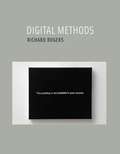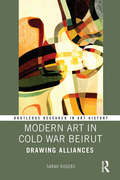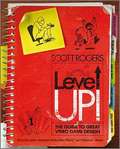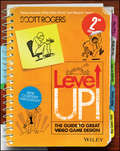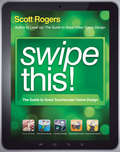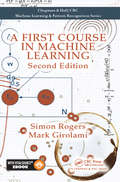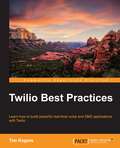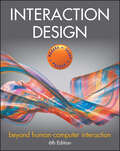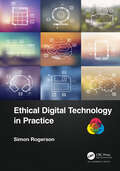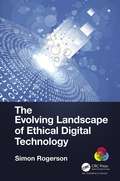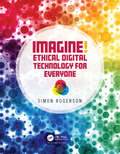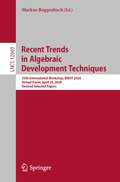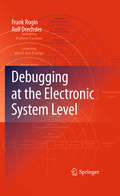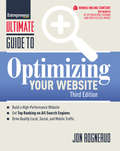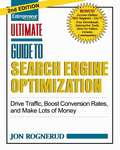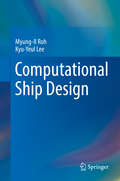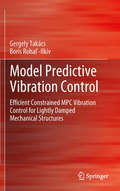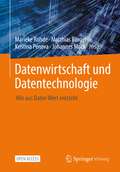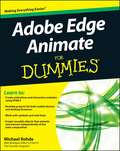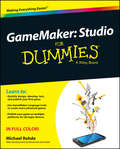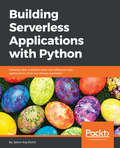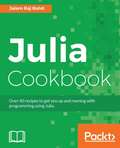- Table View
- List View
Digital Methods
by Richard RogersIn Digital Methods, Richard Rogers proposes a methodological outlook for social and cultural scholarly research on the Web that seeks to move Internet research beyond the study of online culture. It is not a toolkit for Internet research, or operating instructions for a software package; it deals with broader questions. How can we study social media to learn something about society rather than about social media use? How can hyperlinks reveal not just the value of a Web site but the politics of association? Rogers proposes repurposing Web-native techniques for research into cultural change and societal conditions. We can learn to reapply such "methods of the medium" as crawling and crowd sourcing, PageRank and similar algorithms, tag clouds and other visualizations; we can learn how they handle hits, likes, tags, date stamps, and other Web-native objects. By "thinking along" with devices and the objects they handle, digital research methods can follow the evolving methods of the medium. Rogers uses this new methodological outlook to examine the findings of inquiries into 9/11 search results, the recognition of climate change skeptics by climate-change-related Web sites, the events surrounding the Srebrenica massacre according to Dutch, Serbian, Bosnian, and Croatian Wikipedias, presidential candidates' social media "friends," and the censorship of the Iranian Web. With Digital Methods, Rogers introduces a new vision and method for Internet research and at the same time applies them to the Web's objects of study, from tiny particles (hyperlinks) to large masses (social media).
Modern Art in Cold War Beirut: Drawing Alliances (Routledge Research in Art History)
by Sarah RogersModern Art in Cold War Beirut: Drawing Alliances examines the entangled histories of modern art and international politics during the decades of the 1950s and 1960s. Positing the Cold War as a globalized conflict, fraught with different political ideologies and intercultural exchanges, this study asks how these historical circumstances shaped local debates in Beirut over artistic pedagogy, the social role of the artist, the aesthetics of form, and, ultimately, the development of a national art. Drawing on a range of archival material and taking an interdisciplinary approach, Sarah Rogers argues that the genealogies of modern art can never be understood as isolated, national histories, but rather that they participate in an ever contingent global modernism. This book will be of particular interest to scholars in art history, Cold War studies, and Middle East studies.
Level Up!
by Scott RogersDesign and build cutting-edge video games with help from video game expert Scott Rogers!If you want to design and build cutting-edge video games but aren't sure where to start, then this is the book for you. Written by leading video game expert Scott Rogers, who has designed the hits Pac Man World, Maxim vs. Army of Zin, and SpongeBob Squarepants, this book is full of Rogers's wit and imaginative style that demonstrates everything you need to know about designing great video games.Features an approachable writing style that considers game designers from all levels of expertise and experienceCovers the entire video game creation process, including developing marketable ideas, understanding what gamers want, working with player actions, and moreOffers techniques for creating non-human characters and using the camera as a characterShares helpful insight on the business of design and how to create design documentsSo, put your game face on and start creating memorable, creative, and unique video games with this book!
Level Up! The Guide to Great Video Game Design
by Scott RogersWant to design your own video games? Let expert Scott Rogers show you how! If you want to design and build cutting-edge video games but aren’t sure where to start, then the SECOND EDITION of the acclaimed Level Up! is for you! Written by leading video game expert Scott Rogers, who has designed the hits Pac Man World, Maximo and SpongeBob Squarepants, this updated edition provides clear and well-thought out examples that forgo theoretical gobbledygook with charmingly illustrated concepts and solutions based on years of professional experience. Level Up! 2nd Edition has been NEWLY EXPANDED to teach you how to develop marketable ideas, learn what perils and pitfalls await during a game’s pre-production, production and post-production stages, and provide even more creative ideas to serve as fuel for your own projects including: Developing your game design from the spark of inspiration all the way to production Learning how to design the most exciting levels, the most precise controls, and the fiercest foes that will keep your players challenged Creating games for mobile and console systems – including detailed rules for touch and motion controls Monetizing your game from the design up Writing effective and professional design documents with the help of brand new examples Level Up! 2nd Edition is includes all-new content, an introduction by David “God of War” Jaffe and even a brand-new chili recipe –making it an even more indispensable guide for video game designers both “in the field” and the classroom. Grab your copy of Level Up! 2nd Edition and let’s make a game!
Level Up! The Guide to Great Video Game Design
by Scott RogersWant to design your own video games? Let expert Scott Rogers show you how!If you want to design and build cutting-edge video games but aren't sure where to start, then the SECOND EDITION of the acclaimed Level Up! is for you! Written by leading video game expert Scott Rogers, who has designed the hits Pac Man World, Maximo and SpongeBob Squarepants, this updated edition provides clear and well-thought out examples that forgo theoretical gobbledygook with charmingly illustrated concepts and solutions based on years of professional experience.Level Up! 2nd Edition has been NEWLY EXPANDED to teach you how to develop marketable ideas, learn what perils and pitfalls await during a game's pre-production, production and post-production stages, and provide even more creative ideas to serve as fuel for your own projects including:Developing your game design from the spark of inspiration all the way to productionLearning how to design the most exciting levels, the most precise controls, and the fiercest foes that will keep your players challengedCreating games for mobile and console systems - including detailed rules for touch and motion controlsMonetizing your game from the design upWriting effective and professional design documents with the help of brand new examplesLevel Up! 2nd Edition is includes all-new content, an introduction by David "God of War" Jaffe and even a brand-new chili recipe -making it an even more indispensable guide for video game designers both "in the field" and the classroom.Grab your copy of Level Up! 2nd Edition and let's make a game!
Swipe This!
by Scott RogersLearn to design games for tablets from a renowned game designer!Eager to start designing games for tablets but not sure where to start? Look no further! Gaming guru Scott Rogers has his finger on the pulse of tablet game design and is willing to impart his wisdom and secrets for designing exciting and successful games. As the creator of such venerable games as God of War, the SpongeBob Squarepants series, and Pac-Man World, to name a few, Rogers writes from personal experience and in this unique book, he hands you the tools to create your own tablet games for the iPad, Android tablets, Nintendo DS, and other touchscreen systems.Covers the entire tablet game creation process, placing a special focus on the intricacies and pitfalls of touch-screen game designExplores the details and features of tablet game systems and shows you how to develop marketable ideas as well as market your own gamesOffers an honest take on what perils and pitfalls await you during a game's pre-production, production, and post-production stagesFeatures interviews with established tablet game developers that serve to inspire you as you start to make your own tablet game designSwipe This! presents you with an in-depth analysis of popular tablet games and delivers a road map for getting started with tablet game design.
A First Course in Machine Learning
by Simon Rogers Mark Girolami"A First Course in Machine Learning by Simon Rogers and Mark Girolami is the best introductory book for ML currently available. It combines rigor and precision with accessibility, starts from a detailed explanation of the basic foundations of Bayesian analysis in the simplest of settings, and goes all the way to the frontiers of the subject such as infinite mixture models, GPs, and MCMC."—Devdatt Dubhashi, Professor, Department of Computer Science and Engineering, Chalmers University, Sweden "This textbook manages to be easier to read than other comparable books in the subject while retaining all the rigorous treatment needed. The new chapters put it at the forefront of the field by covering topics that have become mainstream in machine learning over the last decade."—Daniel Barbara, George Mason University, Fairfax, Virginia, USA "The new edition of A First Course in Machine Learning by Rogers and Girolami is an excellent introduction to the use of statistical methods in machine learning. The book introduces concepts such as mathematical modeling, inference, and prediction, providing ‘just in time’ the essential background on linear algebra, calculus, and probability theory that the reader needs to understand these concepts."—Daniel Ortiz-Arroyo, Associate Professor, Aalborg University Esbjerg, Denmark "I was impressed by how closely the material aligns with the needs of an introductory course on machine learning, which is its greatest strength…Overall, this is a pragmatic and helpful book, which is well-aligned to the needs of an introductory course and one that I will be looking at for my own students in coming months."—David Clifton, University of Oxford, UK "The first edition of this book was already an excellent introductory text on machine learning for an advanced undergraduate or taught masters level course, or indeed for anybody who wants to learn about an interesting and important field of computer science. The additional chapters of advanced material on Gaussian process, MCMC and mixture modeling provide an ideal basis for practical projects, without disturbing the very clear and readable exposition of the basics contained in the first part of the book." —Gavin Cawley, Senior Lecturer, School of Computing Sciences, University of East Anglia, UK "This book could be used for junior/senior undergraduate students or first-year graduate students, as well as individuals who want to explore the field of machine learning…The book introduces not only the concepts but the underlying ideas on algorithm implementation from a critical thinking perspective."—Guangzhi Qu, Oakland University, Rochester, Michigan, USA
Twilio Best Practices
by Tim RogersIf you have experience with at least one programming language and are looking to integrate Twilio into your applications, then this book is for you.
Cyberbullying
by Vanessa RogersChildren and teenagers text, network and twitter online as second nature, but when emails or texts are used to threaten, harass, intimidate or embarrass someone, they can turn from being a source of enjoyment to a source of crippling anxiety and fear. This approachable book is packed with advice, games and activities for groups and individuals to help young people understand what cyberbullying is, how they should behave online and how they can stay safe. The activities range from quizzes and competitions to storyboard games and art activities, and cover issues such as how easily personal information can be forwarded, the risks posed by unknown 'friends' on social networking sites, and how to discuss and deal with bullying issues. They are designed to encourage young people to think about their own behaviour and attitudes and give them the skills and knowledge to stay safe in a digital world. Particularly suited to children and teens aged 11+, this essential book will be an invaluable resource for parents, teachers, youth workers, and anyone working with young people who could be exposed to cyberbullying.
Interaction Design: Beyond Human-Computer Interaction
by Yvonne Rogers Helen Sharp Jennifer PreeceA delightful, engaging, and comprehensive overview of interaction design Effective and engaging design is a critical component of any digital product, from virtual reality software to chatbots, smartphone apps, and more. In the newly updated sixth edition of Interaction Design: Beyond Human-Computer Interaction, a team of accomplished technology, design, and computing professors delivers an intuitive and instructive discussion of the principles underlying the design of effective interactive technologies. The authors discuss how to design and apply digital technologies in the real world, illustrated with numerous examples. The book explores the interdisciplinary foundations of interaction design, including skills from product design, computer science, human and social psychology, and others. The book builds on the highly successful fifth edition and draws on extensive new research and interviews with accomplished professionals and researchers in the field that reflect a rapidly-changing landscape. It is supported by a website hosting digital resources that add to and complement the material contained within. Readers will also find: Explorations of the social and emotional components of interacting with apps, digital devices and computers Descriptions about how to design, prototype, evaluate and construct technologies that support human-computer interaction Discussions of the cognitive aspects of interaction design, as well as design and evaluation, including usability testing and expert reviews. An essential text for undergraduate and graduate students of human-computer interaction, interaction design, software engineering, web design, and information studies, Interaction Design will also prove to be indispensable for interaction design and user experience professionals.
Ethical Digital Technology in Practice
by Simon RogersonThis is an important book. Ethics is not an easy topic, and arguably the ethics of IT is less so—not leastdue to its potential for developing and evolving in ways that are either unforeseen or unimaginable . . . . Use this book as a practical resource, an informative and educational source of material in developing expertise, but also as an invaluable toolkit to support practical application of ethical thinking. —Declan Brady, President of the Irish Computer Society and a member of the Board of Directors of the Council of European Professional Informatics Societies Digital technology is about people. It is about those who plan, develop and implement applications which other people use and are affected by. It is about the impact on all these people as well as on the world at large. Ethical Digital Technology in Practice takes a real-world perspective to explore these impacts over time and discover ways in which to promote ethical digital technology through good practice. It draws upon the author’s published articles in trade magazines, professional journals and online blogs. These are synthesised into a blueprint which addresses, in a practical manner, the societal issues surrounding the increasing use and abuse of digital technology. It is a follow-up book to the author’s book The Evolving Landscape of Ethical Digital Technology, which has a researcher’s perspective. This book is a hands-on account of the computer revolution from 1995 to the current day when the world is increasingly dependent on digital technology. It explores some of the social and ethical issues that are part of this revolution. This is not a book about deep philosophical and technical concepts. Nor does it claim to be comprehensive. It is the author’s personal account of technological change and its effects on people. It is written by a boy who was smitten by computer technology at the age of 15, became a computer professional and subsequently spent many years showing young people how to develop and use digital technology in a good way. It is a book based upon the author’s engagement with practitioners, academics and students during the period as well as his continued fascination with this fantastic technology. Ethical Digital Technology in Practice is a book about the real world, of what has happened and what might happen as digital technology continues to pervade.
The Evolving Landscape of Ethical Digital Technology
by Simon RogersonIn a world that is awash in ubiquitous technology, even the least tech-savvy know that we must take care how that technology affects individuals and society. That governments and organizations around the world now focus on these issues, that universities and research institutes in many different languages dedicate significant resources to study the issues, and that international professional organizations have adopted standards and directed resources toward ethical issues in technology is in no small part the result of the work of Simon Rogerson. – Chuck Huff, Professor of Social Psychology at Saint Olaf College, Northfield, Minnesota In 1995, Apple launched its first WWW server, Quick Time On-line. It was the year Microsoft released Internet Explorer and sold 7 million copies of Windows 95 in just 2 months. In March 1995, the author Simon Rogerson opened the first ETHICOMP conference with these words: We live in a turbulent society where there is social, political, economic and technological turbulence … it is causing a vast amount of restructuring within all these organisations which impacts on individuals, which impacts on the way departments are set up, organisational hierarchies, job content, span of control, social interaction and so on and so forth. … Information is very much the fuel of modern technological change. Almost anything now can be represented by the technology and transported to somewhere else. It's a situation where the more information a computer can process, the more of the world it can actually turn into information. That may well be very exciting, but it is also very concerning. That could be describing today. More than 25 years later, these issues are still at the forefront of how ethical digital technology can be developed and utilised. This book is an anthology of the author’s work over the past of 25 years of pioneering research in digital ethics. It is structured into five themes: Journey, Process, Product, Future and Education. Each theme commences with an introductory explanation of the papers, their relevance and their interrelationship. The anthology finishes with a concluding chapter which summarises the key messages and suggests what might happen in the future. Included in this chapter are insights from some younger leading academics who are part of the community charged with ensuring that ethical digital technology is realised.
Imagine! Ethical Digital Technology for Everyone
by Simon RogersonYou will find in this book a fascinating critical analysis about digital technology from a humanistic perspective.... You will enjoy pictures, poems, stories, and quotations that should encourage self-reflection and community discussion about your real life, your digital life, and the role of technology in society..... This book is oriented towards anyone and everyone, breaking the academic and professional barriers thereby increasing universal awareness of the importance of the ethical concerns surrounding digital technology.—Mario Arias Oliva, Profesor Titular de Universidad Complutense de Madrid. Our dependency on digital technology keeps growing. Are we happy with this? Do we understand the positives and negatives of being so dependent? Imagine! Ethical Digital Technology for Everyone will help everyone to better understand these issues through the use of stories, pictures and poems which explore the world of digital technology. The aim is to demystify and encourage the reader to reflect on how to get the best out of digital technology, but not at the expense of others or of the world at large. This unique book has something for everyone regardless of age, background or technological awareness. It will help to give the reader the confidence to challenge societally unacceptable and promote societally beneficial digital technology offerings. The book is a meeting between technology and the creative arts as our lives become more and more technologically dependent. It aligns with the transition of STEM (Science, Technology, Engineering, and Mathematics) to STEAM (Science, Technology, Engineering, Arts and Mathematics), which aims to promote creativity and curiosity. The book has four facets: short stories, quotations, pictures (many of which are schematics) and poetry about the social and ethical issues surrounding digital technology. Through a lens of creative arts, the book maps the evolution of digital technology from its infancy through to glimpses of the future. This includes many first-hand examples from the 1970s onwards. Alongside this account, surrounding ethical and social issues are portrayed. These two elements are synthesized to encourage thought about how the challenges of evolving digital technology can be met thus leading to social benefit for all of us.
Recent Trends in Algebraic Development Techniques: 25th International Workshop, WADT 2020, Virtual Event, April 29, 2020, Revised Selected Papers (Lecture Notes in Computer Science #12669)
by Markus RoggenbachThis book constitutes the thoroughly refereed post-conference proceedings of the 25th International Workshop on Algebraic Development Techniques, WADT 2020, held virtually in April 2020.The 7 revised papers presented together with an invited paper were carefully reviewed and selected from 9 submissions. The contributed presentations covered a range of topics about the algebraic approach to system specification, which encompasses many aspects of the formal design of software systems. Originally born as formal method for reasoning about abstract data types, the algebraic approach now covers new specification frameworks and programming paradigms (such as object-oriented, aspect-oriented, agent-oriented, logic, and higher-order functional programming) as well as a wide range of application areas (including information systems, concurrent, distributed, and mobile systems).
Microsoft Office 2010: Marquee Series (Brief Edition)
by Audrey Rutkosky Roggenkamp Denise Seguin Nita RutkoskyMarquee Series, Microsoft Office 2010 prepares students to work with Microsoft Office 2010 in a business office or for personal use. Incorporating an accelerated, step-by-step, project-based approach, this text builds student competency in Word, Excel, Access, and PowerPoint 2010 and the essential features of Windows 7 and Internet Explorer 8.0.
Debugging at the Electronic System Level
by Frank Rogin Rolf DrechslerDebugging becomes more and more the bottleneck to chip design productivity, especially while developing modern complex integrated circuits and systems at the Electronic System Level (ESL). Today, debugging is still an unsystematic and lengthy process. Here, a simple reporting of a failure is not enough, anymore. Rather, it becomes more and more important not only to find many errors early during development but also to provide efficient methods for their isolation. In Debugging at the Electronic System Level the state-of-the-art of modeling and verification of ESL designs is reviewed. There, a particular focus is taken onto SystemC. Then, a reasoning hierarchy is introduced. The hierarchy combines well-known debugging techniques with whole new techniques to improve the verification efficiency at ESL. The proposed systematic debugging approach is supported amongst others by static code analysis, debug patterns, dynamic program slicing, design visualization, property generation, and automatic failure isolation. All techniques were empirically evaluated using real-world industrial designs. Summarized, the introduced approach enables a systematic search for errors in ESL designs. Here, the debugging techniques improve and accelerate error detection, observation, and isolation as well as design understanding.
Ultimate Guide to Optimizing Your Website
by Jon RognerudWritten for beginners, author Jon Rognerud offers every tip, trick, and secret from keyword research and competitive analysis, to marketing and messaging, content development, link building, and conversions and tracking of search engine positions. Local search, social media, and blogging are new to this edition, and show examples on how to optimize these important new development areas. Updated content includes social media search content that reflects strategies and market information to helps business owners easily add this companion to SEO work, blog optimization steps with best SEO tactics for creating search engine friendly sites, and the top ten hottest WordPress plugins for top traffic boost. A local SEO section shows readers how to avoid the most common mistakes on optimizaing for local search and the updated section on Google analytics shows how to track top keywords and pages. An updated link building section provides new white hat SEO link building tactics to provide better long term rankings and traffic building, and an expanded resource section includes updated screen-shots of SEO applied. Step-by-step examples are written with an "at the kitchen table" type dialogue for accessibility and an advanced strategy section takes readers to the next level.
Ultimate Guide to Search Engine Optimization
by Jon RognerudWritten for beginners, Rognerud offers every tip, trick and secret from keyword research, competitive analysis, marketing and messaging, content development, link building, conversions and tracking of search engine positions. Local search, social media and blogging are new to this edition, and show examples and steps on how to optimize these important, new development areas. Members only website offers free videos, step-by-step examples and updates and tools to help track your competition. Social media search content is updated to reflect strategies and market information Blog optimization steps are included with best SEO tactics for creating search engine friendly sites Includes top 10 hottest WordPress plugins you must use for top traffic boost Local SEO section shows you how to avoid the most common mistakes on optimizing for local search. local search. The updated section on Google analytics shows how to track top keywords and pages. Find out where visitors are leaving your site and if they are coming back and give readers the tools to fix an existing site that may have traffic but doesn't convert it into sales. Offers an updated link building section with new white hat SEO link building tactics to provide better long term rankings and traffic building.
Computational Ship Design (Springer Series On Naval Architecture, Marine Engineering, Shipbuilding And Shipping Ser. #4)
by Myung-Il Roh Kyu-Yeul LeeThis book offers an introduction to the fundamental principles and systematic methodologies employed in computational approaches to ship design. It takes a detailed approach to the description of the problem definition, related theories, mathematical formulation, algorithm selection, and other core design information. Over eight chapters and appendices the book covers the complete process of ship design, from a detailed description of design theories through to cutting-edge applications. Following an introduction to relevant terminology, the first chapters consider ship design equations and models, freeboard calculations, resistance prediction and power estimation. Subsequent chapters cover topics including propeller deign, engine selection, hull form design, structural design and outfitting. The book concludes with two chapters considering operating design and economic factors including construction costs and fuel consumption. The book reflects first-hand experiences in ship design and R&D activities, and incorporates improvements based on feedback received from many industry experts. Examples provided are based on genuine case studies in the field. The comprehensive description of each design stage presented in this book offers guidelines for academics, researchers, students, and industrial manufactures from diverse fields, including ocean engineering and mechanical engineering. From a commercial point of view the book will be of great value to those involved in designing a new vessel or improving an existing ship.
Model Predictive Vibration Control
by Boris Rohaľ-Ilkiv Gergely TakácsReal-time model predictive controller (MPC) implementation in active vibration control (AVC) is often rendered difficult by fast sampling speeds and extensive actuator-deformation asymmetry. If the control of lightly damped mechanical structures is assumed, the region of attraction containing the set of allowable initial conditions requires a large prediction horizon, making the already computationally demanding on-line process even more complex. Model Predictive Vibration Control provides insight into the predictive control of lightly damped vibrating structures by exploring computationally efficient algorithms which are capable of low frequency vibration control with guaranteed stability and constraint feasibility. In addition to a theoretical primer on active vibration damping and model predictive control, Model Predictive Vibration Control provides a guide through the necessary steps in understanding the founding ideas of predictive control applied in AVC such as: · the implementation of computationally efficient algorithms · control strategies in simulation and experiment and · typical hardware requirements for piezoceramics actuated smart structures. The use of a simple laboratory model and inclusion of over 170 illustrations provides readers with clear and methodical explanations, making Model Predictive Vibration Control the ideal support material for graduates, researchers and industrial practitioners with an interest in efficient predictive control to be utilized in active vibration attenuation.
Datenwirtschaft und Datentechnologie: Wie aus Daten Wert entsteht
by Marieke Rohde Matthias Bürger Kristina Peneva Johannes MockIn diesem Open-Access-Buch stehen die wirtschaftliche Verwertung von Daten und die dazu gehörenden technischen und organisatorischen Prozesse und Strukturen in Unternehmen im Fokus. Es behandelt Themen wie Datenmonetarisierung, Datenverträge, Data Governance, Informationssicherheit, Datenschutz und die Vertrauenswürdigkeit von Daten.Seit Jahren wird davon gesprochen, dass „Daten das neue Öl“ sind. Expertinnen und Experten sind sich einig: Das Wertschöpfungspotential von Daten ist enorm und das über fast alle Branchen und Geschäftsfelder hinweg. Und dennoch bleibt ein Großteil dieses Potentials ungehoben. Deshalb nimmt dieser Sammelband konkrete Innovationshemmnisse, die bei der Erschließung des wirtschaftlichen Werts von Daten auftreten können, in den Blick. Er bietet praktische Lösungsansätze für diese Hürden an den Schnittstellen von Ökonomie, Recht, Akzeptanz und Technik. Dazu folgen die Autorinnen und Autoren einem interdisziplinären Ansatz und greifen aktuelle Diskussionen aus der Wissenschaft auf, adressieren praxisnahe Herausforderungen und geben branchenunabhängige Handlungsempfehlungen. Den Leserinnen und Lesern soll eine transparente Informationsbasis angeboten werden und damit die Teilnahme an der Datenwirtschaft erleichtert werden. Dieses Buch richtet sich an Entscheidungsträgerinnen und Entscheidungsträger in Unternehmen sowie an Entwicklerinnen und Entwickler datenbasierter Dienste und Produkte. Der Band ist ebenfalls für Fachkräfte der angewandten Forschung wie auch für interdisziplinär Studierende z.B. der Wirtschaftsinformatik, der technikorientierten Rechtswissenschaft oder der Techniksoziologie relevant.
Adobe Edge Animate CC For Dummies
by Michael RohdeThe easy way to build HTML5 mobile and web apps using Adobe's new Edge Animate CCEdge Animate CC is an approachable WYSIWYG alternative for leveraging the power of languages like HTML5, CSS3, and JavaScript to design and develop for the web and mobile devices, even if you have no programming experience. Written by Michael Rohde, the book calls on this seasoned web developer's wealth of experience using Edge Animate CC, and a companion website includes all code from the book to help you apply what you learn as you go.Features an easy-to-use interface, with a properties-based timeline for impeccable accuracy and controlContains a guide to creating new compositions, importing and animating existing web graphics, or adding motion to existing HTML files without compromising integrityOffers support for web font services, and Element Display, which lets you manage how long elements are displayed on the stageEdge Animate CC For Dummies offers the lowdown on this revolutionary and intuitive tool for creating motion content that runs beautifully on mobile devices and desktop browsers.
GameMaker
by Michael RohdeGet gaming faster with the official guide to GameMaker:Studio GameMaker: Studio allows you to create your own games, even withzero coding experience, and GameMaker: Studio For Dummies isa complete guide to the ins and outs of the program. Create thegame you've always wanted to play in record time and at a fractionof the cost of traditional game development methods. You'll havethe flexibility to develop 2D games for Android, iOS, desktops, andthe Web. Gain a professional perspective on this revolutionary pathto game creation and publishing.Using GameMaker: Studio may feel like play, but it's a serioustool that allows you to create, design, develop, and publish yourvery own games. With the push of a button, the program producesreal, executable code for your very own "app store"-ready 2D game,complete and ready for market. GameMaker: Studio For Dummiesprovides complete and accurate information on how to create classicgames and special effects, written in the characteristicallyeasy-to-read Dummies style. Topics include:An overview of Studio, and how to get startedThe basic tools and techniques at the core of your designAdvanced techniques for more seasoned game designersAn inside look at what the premium upgrades have to offerGameMaker: Studio makes game design 80% faster than coding fornative languages, so you can take your game from concept to marketin a matter of weeks. Why waste time and money doing it any otherway? Whether you already have great ideas or just want to dabble,GameMaker: Studio For Dummies is the guide that will takeyou straight to guru status.
Building Serverless Applications with Python: Develop fast, scalable, and cost-effective web applications that are always available
by Jalem Raj RohitBuilding efficient Python applications at minimal cost by adopting serverless architecturesKey Features Design and set up a data flow between cloud services and custom business logic Make your applications efficient and reliable using serverless architecture Build and deploy scalable serverless Python APIsBook DescriptionServerless architectures allow you to build and run applications and services without having to manage the infrastructure. Many companies have adopted this architecture to save cost and improve scalability. This book will help you design serverless architectures for your applications with AWS and Python.The book is divided into three modules. The first module explains the fundamentals of serverless architecture and how AWS lambda functions work. In the next module, you will learn to build, release, and deploy your application to production. You will also learn to log and test your application. In the third module, we will take you through advanced topics such as building a serverless API for your application. You will also learn to troubleshoot and monitor your app and master AWS lambda programming concepts with API references. Moving on, you will also learn how to scale up serverless applications and handle distributed serverless systems in production.By the end of the book, you will be equipped with the knowledge required to build scalable and cost-efficient Python applications with a serverless framework.What you will learn Understand how AWS Lambda and Microsoft Azure Functions work and use them to create an application Explore various triggers and how to select them, based on the problem statement Build deployment packages for Lambda functions Master the finer details about building Lambda functions and versioning Log and monitor serverless applications Learn about security in AWS and Lambda functions Scale up serverless applications to handle huge workloads and serverless distributed systems in production Understand SAM model deployment in AWS LambdaWho this book is forThis book is for Python developers who would like to learn about serverless architecture. Python programming knowledge is assumed.
Julia Cookbook
by Jalem Raj RohitOver 40 recipes to get you up and running with programming using Julia About This Book * Follow a practical approach to learn Julia programming the easy way * Get an extensive coverage of Julia's packages for statistical analysis * This recipe-based approach will help you get familiar with the key concepts in Juli Who This Book Is For This book is for data scientists and data analysts who are familiar with the basics of the Julia language. Prior experience of working with high-level languages such as MATLAB, Python, R, or Ruby is expected. What You Will Learn * Extract and handle your data with Julia * Uncover the concepts of metaprogramming in Julia * Conduct statistical analysis with StatsBase.jl and Distributions.jl * Build your data science models * Find out how to visualize your data with Gadfly * Explore big data concepts in Julia In Detail Want to handle everything that Julia can throw at you and get the most of it every day? This practical guide to programming with Julia for performing numerical computation will make you more productive and able work with data more efficiently. The book starts with the main features of Julia to help you quickly refresh your knowledge of functions, modules, and arrays. We'll also show you how to utilize the Julia language to identify, retrieve, and transform data sets so you can perform data analysis and data manipulation. Later on, you'll see how to optimize data science programs with parallel computing and memory allocation. You'll get familiar with the concepts of package development and networking to solve numerical problems using the Julia platform. This book includes recipes on identifying and classifying data science problems, data modelling, data analysis, data manipulation, meta-programming, multidimensional arrays, and parallel computing. By the end of the book, you will acquire the skills to work more effectively with your data. Style and approach This book has a recipe-based approach to help you grasp the concepts of Julia programming.
